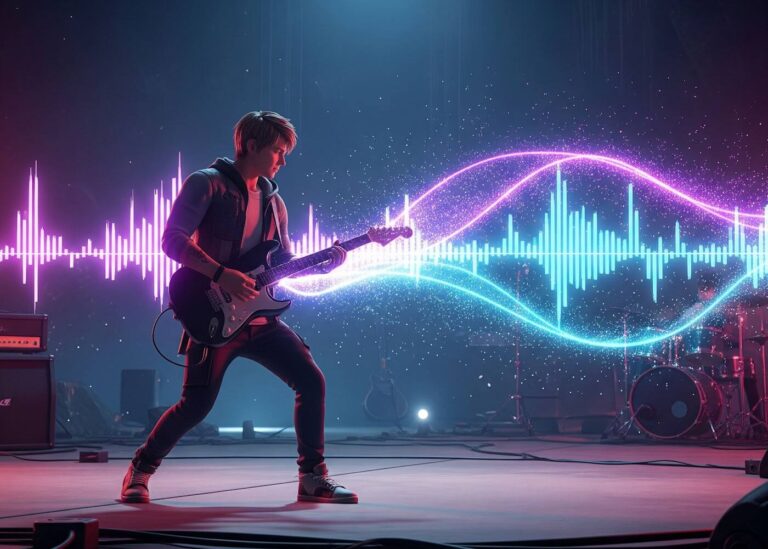Can a Soundtrack Make or Break a Game?
In the realm of video gaming, a soundtrack serves as an essential auditory component that enriches the overall experience for players. A game soundtrack is comprised of the music and sound effects specifically crafted to accompany the gameplay. Its role extends beyond merely filling the silence; it shapes the emotional landscape of the game, propelling narrative elements and enhancing player immersion.
The historical evolution of game soundtracks is fascinating, tracing back to the early days of gaming in the late 1970s and early 1980s. Initially, game soundtracks consisted of simplistic beeps and boops, driven by the technological limitations of the time. As technology advanced, so too did the complexity and depth of soundtracks. By the 1990s, developers began integrating digitized music and sound samples into their games, laying the groundwork for the creation of more intricate and expressive scores.
With advancements in digital audio technology, the late 1990s and early 2000s ushered in a new era of game soundtracks characterized by fully orchestrated scores, often composed by renowned musicians. This marked a significant shift in how soundtracks were perceived, elevating them from mere background noise to integral components of the gaming experience. The music now has the power to evoke a range of emotions, from exhilaration during intense moments to nostalgia in quieter reflective scenes.
Today, soundtracks play a pivotal role in crafting a cohesive narrative and ensuring that the gameplay resonates with players on a deeper emotional level. By creating distinct atmospheres that align with the action, soundtracks can amplify tension, convey story arcs, and even dictate the pace of gameplay. This multifaceted relationship between soundtracks and gameplay showcases the importance of sound in transforming a game into an immersive experience.
The Emotional Impact of Music in Gaming
The role of music in gaming extends far beyond mere background noise; it serves as a crucial component that can profoundly influence the emotional experiences of players. Research in psychology emphasizes music’s ability to elicit specific emotions and set the overall mood during gameplay, affecting how players engage with the narrative and mechanics of a game. This emotional resonance created by soundtracks can enhance immersion, leading to a more memorable gaming experience.
One of the key psychological effects of music lies in its capacity to evoke strong emotional responses. For instance, the use of major and minor keys can manipulate feelings of joy or sadness, while tempo variations can heighten excitement or tension. A gradual crescendo might signal an impending climax, preparing players for an intense moment. This dynamic interplay between music and gameplay helps to shape a player’s emotional journey, further connecting them to the storyline and characters. Ultimately, music acts as a narrative device, weaving together the various elements of a game.
Several notable examples illustrate the powerful influence of music in gaming. In “The Last of Us,” for instance, composer Gustavo Santaolalla created a haunting soundtrack that perfectly encapsulates the game’s themes of loss and survival. The emotional weight of each scene is amplified by the subtle nuances of the music, guiding players through moments of sorrow and reflection. Similarly, “Journey” features a unique score that evolves with the player’s actions, resulting in a rich, emotional tapestry that resonates deeply with audiences.
In summary, the soundtracks in games are far more than mere embellishments; they are vital elements that shape players’ emotional experiences and responses. Through strategic sound design and expert compositional techniques, game developers can create music that significantly enhances the overall impact of their narratives, demonstrating the undeniable connection between music and emotional engagement in gaming.
Case Studies: Soundtracks That Transformed Games
The impact of a well-crafted soundtrack on video games has been exemplified through various iconic titles, where the music transcends mere background audio to become an integral part of the gaming experience. Notable among these is ‘The Legend of Zelda,’ where Koji Kondo’s compositions have created an immersive world. The scores are designed to emphasize emotional moments, enhance exploration, and provide an auditory cue that aligns closely with gameplay. The legendary theme itself evokes a sense of adventure, forming a nostalgic connection that has persisted across generations.
Another prominent example is the ‘Final Fantasy’ series, particularly the works of Nobuo Uematsu. The music in these games is not only memorable but is intertwined with character development and storytelling. For instance, themes associated with specific characters can evoke profound emotional responses, allowing players to bond with the narrative on a deeper level. The score of ‘Final Fantasy VII,’ featuring tracks like “Aerith’s Theme,” has become emblematic of video game music that can evoke a range of emotions, from joy to sorrow, ultimately enhancing the player’s investment in the story.
‘Journey’ is an additional compelling case that demonstrates the power of soundtrack in gaming. The game’s minimalistic design is beautifully complemented by Austin Wintory’s dynamic score, which adapts to the player’s actions, creating a unique auditory experience for each session. This not only intensifies immersion but also reinforces the game’s themes of exploration and connection, allowing players to feel a profound sense of narrative progression through sound alone.
In these cases, the soundtracks are not merely supplementary elements; they are essential to the storytelling and emotional landscape of the games. By skillfully integrating music with gameplay, these titles underscore the significance of sound in enhancing player experience and immersion.
The Role of Sound Design in Gameplay
Sound design plays a critical role in enhancing the gaming experience, often extending beyond the mere inclusion of a soundtrack. While a soundtrack consists primarily of the instrumental and vocal music accompanying a game, sound design encompasses a broader range of audio elements, including sound effects, ambient noises, and environmental sounds. This comprehensive auditory palette is essential in creating a fully immersive gaming environment that can significantly influence player emotions and responses.
Sound effects serve to augment the actions occurring within the game, providing feedback that is vital for gameplay mechanics. For instance, the distinctive sound of footsteps can convey different terrains, alerting players to their environment’s characteristics. Likewise, the sound of a gun firing or a spell being cast not only informs players of their actions but also enhances the dramatic impact of those moments. Effective sound design enables these effects to be tailored to fit the game’s tone and setting, thereby enriching the overall experience.
Ambient noises contribute an additional layer of depth, establishing mood and enhancing player immersion. The rustling of leaves in a forest, the distant chatter of townsfolk, or the echoes of a cavern all create a rich auditory background that can draw players further into the game world. This layering of sounds works in synergy with the soundtrack, which often sets the emotional tone or accentuates pivotal moments within the narrative. For example, during a high-stakes battle scene, a rousing musical score combined with impactful sound effects can heighten tension and adrenaline, leading to a more engaging gameplay experience.
Thus, the combination of sound design and a well-composed soundtrack is fundamental in crafting an engaging game atmosphere. When executed effectively, this synthesis can significantly elevate gameplay dynamics, fostering player investment and enhancing overall enjoyment.
Cultural and Genre Influences on Soundtracks
The relationship between gaming genres and their soundtracks is often profound, as different styles of music evoke distinct emotional responses tailored to the gaming experience. For example, horror games frequently employ dissonant and eerie soundscapes, using unsettling musical elements to enhance tension and fear. The use of abrupt changes in tempo and tonal shifts can amplify a player’s sense of dread and anticipation, drawing them deeper into the game’s ominous atmosphere. In contrast, action games often feature high-energy soundtracks that incorporate fast-paced rhythms and driving beats, aiming to elevate adrenaline levels and keep players engaged during intense moments.
Role-playing games (RPGs) present a different case altogether, generally adopting expansive and thematic soundtracks that reflect their narrative depth. These soundtracks may include orchestral arrangements or folk melodies, depending on the game’s setting—be it a fantastical realm or a more realistic environment. The music choices in RPGs can serve to enhance storytelling, providing a sonic backdrop that complements character development and plot progression, thereby making the musical composition an integral part of the overall experience.
Cultural influences also play a significant role in shaping game soundtracks. For instance, games developed outside of Western markets may incorporate traditional instruments, styles, and musical scales that reflect their origins. Non-Western games often blend local cultural elements with modern genres, creating unique soundtracks that resonate with both local and global audiences. This cultural infusion not only showcases regional artistry but also highlights the global nature of the gaming industry, where diverse sounds can connect players across different backgrounds. Through this integration of genre and culture, soundtracks significantly impact gameplay experience, making them a vital component in the success of a game.
Controversies: Soundtrack Failures and Gamers’ Reactions
The soundtrack of a video game serves as a critical element in shaping players’ experiences. However, there have been controversies surrounding poorly executed soundtracks that have surged into the gaming community, often leading to considerable backlash. Instances where soundtracks have failed to resonate with audiences can detract from the immersive experience that developers strive to create.
One notable example is the game “Aliens: Colonial Marines,” which faced significant criticism not just for its gameplay mechanics but also for its lackluster soundtrack. Many players expressed disappointment over the incidental music not matching the franchise’s established tone. A user review highlighted that the soundtrack felt “generic” and “uninspired,” which ultimately detracted from the tense atmosphere that one would anticipate from a title associated with such an iconic film series. In this case, the failure to deliver a compelling soundtrack contributed to a broader dissatisfaction with the entire gaming experience.
Another instance can be seen in “Final Fantasy XV,” where some fans decried the incorporation of modern and eclectic song choices that deviated from the series’ traditional orchestral style. Critics argued that this shift not only altered the game’s emotional landscape but also alienated longtime fans of the franchise who had come to expect a certain type of musical score. A community forum reflected this sentiment, with a commenter stating, “The music just didn’t fit the epic adventure I was hoping for.”
Industry analysts have posited that a bad soundtrack can sabotage a game’s ability to evoke emotions, adding weight to the argument that soundtracks are more than mere background noise; they shape narrative and gameplay experiences. The failures in these two examples highlight how integral it is for developers to invest time and resources into crafting soundscapes that resonate with their audiences. Ultimately, positive or negative player experiences linked to soundtrack quality underscore the necessity for careful consideration in this vital aspect of game design.
The Future of Game Soundtracks
As the landscape of gaming continues to evolve, the future of game soundtracks is poised for significant transformation. Emerging technologies are creating opportunities for richer, more immersive auditory experiences, paving the way for innovative trends such as adaptive soundtracks and procedural music generation. These advancements are being enhanced further by the integration of artificial intelligence in music composition, promising to reshape the way soundtracks are crafted and experienced by players.
Adaptive soundtracks, an increasingly popular trend, allow music to change dynamically based on player actions or game states. This flexibility creates a more engaging and personalized gaming experience, as soundscapes tailor themselves to the player’s journey. For instance, a soundtrack may intensify during critical moments of gameplay, or soften during exploration phases, reinforcing the emotional nuances of the game. As developers harness adaptive algorithms, players can anticipate unique musical interactions, enhancing overall immersion and connection with the game world.
On the other hand, procedural music generation is another exciting frontier. This technique leverages algorithms to create music on-the-fly, ensuring that each player’s experience is distinct while maintaining a cohesive auditory atmosphere. This approach can significantly lower production costs and time, as it minimizes the need for extensive pre-composed scores. Moreover, the ability to generate unique tracks in response to gameplay patterns introduces an unprecedented level of variability and personalization in soundtracks, which can keep players engaged over prolonged periods.
Finally, as artificial intelligence becomes more sophisticated, it holds the potential to enhance the entire composition process. AI algorithms can analyze player behavior and preferences, generating tailored music that resonates deeply with individual users. This technological integration not only makes soundtracks more interactive but also prompts a rethinking of the composer’s traditional role, as collaboration between human creativity and machine efficiency takes center stage.
Interactivity and the Player’s Role in Soundtrack Appreciation
The interactivity of music in video games plays a crucial role in shaping the overall gaming experience. Unlike traditional media, video games allow players to engage actively with the soundtrack, thereby influencing their emotional and cognitive responses. This dynamic relationship can significantly enhance immersion, enabling players to feel a stronger connection to the narrative and environment.
One way in which player choices impact the soundtrack is through adaptive music systems. Many modern games utilize technology that alters the audio landscape based on in-game events or player performance. For instance, in games like Journey, the music shifts in response to the player’s actions and interactions with the world. This seamless integration of audio and gameplay creates a fluid experience, where the soundtrack reacts to the player’s journey, fostering a unique emotional response tailored to individual gameplay.
Additionally, games such as Hellblade: Senua’s Sacrifice showcase how player decision-making can influence the audio experience. As players navigate through the narrative, the choice of dialogue and actions shapes not only the plot but also the surrounding soundscape. This exemplifies the significance of interactivity in enhancing the game’s emotional depth, as players become integral components of the musical narrative.
Moreover, the engagement of players with the soundtrack can also be seen in rhythm-based games, where the game’s mechanics require synchronization with the music. In titles like Beat Saber, the interaction relies on players’ ability to respond to audio cues, fostering a direct connection between gameplay and music. The player’s success or failure influences the auditory feedback, creating a loop of interaction that reinforces the importance of sound in enhancing the gameplay experience.
Ultimately, the interactivity of music in video games demonstrates that players are not mere spectators but active participants in crafting their auditory experience. This relationship elevates the significance of soundtracks, as they adapt and shift based on players’ choices and actions, thus becoming a pivotal element of game design.
Conclusion: The Lasting Legacy of Game Soundtracks
Throughout this discussion, it has become evident that video game soundtracks hold a paramount position in the overall gaming experience. They serve not only as background music but as an integral component that enhances the narrative and emotional depth of a game. The role of soundtracks extends beyond mere entertainment; they elevate the storytelling experience, providing players with a deeper connection to the characters and the world they inhabit.
Game soundtracks can significantly influence player emotions, evoking feelings that align with the game’s themes and gameplay mechanics. For instance, the use of motifs and recurring musical themes can create a sense of familiarity and attachment, making pivotal moments more impactful. This emotional resonance fosters player engagement, which is essential for overall satisfaction with the gaming experience. Notably, iconic soundtracks have become synonymous with their respective games, leaving an indelible mark on the gaming community.
Moreover, the legacy of these soundtracks extends beyond the confines of individual games. Many memorable compositions have transcended their original contexts, achieving recognition in broader cultural settings. Concerts dedicated to video game music and orchestral arrangements have gained popularity, showcasing the immense talent behind these compositions. This cultural shift underscores the universal appeal of soundtracks in gaming and highlights how they can serve as a bridge between different forms of media.
In conclusion, soundtracks are not merely an accessory to video games; they are a vital component that shapes player experiences. Their ability to enhance narratives, foster emotional connections, and contribute to player satisfaction cannot be overstated. As the gaming industry continues to evolve, the importance of well-crafted soundtracks will remain a fundamental aspect of successful game design, ensuring that players continue to cherish and celebrate the music that accompanies their adventures.







